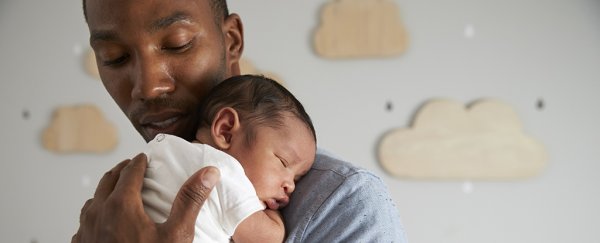At first it sounds implausible, but there's some solid science and an extensive sample size behind this study: in some circumstances, babies who look like their fathers end up being healthier by the time they reach their first birthday.
While the shape of your face doesn't normally affect how healthy you are, researchers are suggesting that a close family resemblance encourages dads to spend more time with their kids – and that's when the positive benefits happen.
The team behind the study suggests that more efforts should be made to keep fathers involved in the upbringing of their children, particularly in broken or fragile families where mum and dad aren't living together.
"Fathers are important in raising a child, and it manifests itself in the health of the child," says one of the researchers, Solomon Polachek from Binghamton University in New York.
It's important to note that the study focused solely on families with mothers and fathers who weren't married or living at the same home. The research looked at 456 families logged as part of the ongoing Fragile Families and Child Wellbeing (FFCW) study.
In fact the researchers think in some of these cases a family likeness between father and son actually helped dads confirm the kid was theirs, which then means they're more likely to invest time in seeing them.
Overall, fathers spent an average of 2.5 days a month more with their children when there was a resemblance compared to when there wasn't.
The health of the children at age one was assessed using a number of factors, including the length of hospital stays, the number of visits to the doctor, and the number of asthma attacks since birth.
While these measurements aren't perfect – even if a child is ill, there might be time or money restraints that prevent a doctor visit – when taken together and allowing for controlling factors, there's still a " statistically significant" trend, the researchers say.
There's a lot of previous research to back these ideas up. Earlier studies have shown that child development can improve when both parents get involved, for example, and that a family resemblance encourages dads to spend more time with their kids.
And how does dad being around help? Babies are better protected from harm and get more care with both parents around, the researchers say – simply put, there are two people rather than one looking out for and dealing with health issues.
"We find a child's health indicators improve when the child looks like the father," says Polachek. "The main explanation is that frequent father visits allow for greater parental time for caregiving and supervision, and for information gathering about child health and economic needs."
"It's been said that 'it takes a village' but my coauthor, Marlon Tracey, and I find that having an involved father certainly helps."
The researchers themselves admit it's difficult to make broader generalisations about married families and families where both parents are living together, but they are keen to emphasise the importance of dad in ensuring a good start in life for kids.
With income equality in the US continuing to increase, and single-parent families often feeling the brunt of economic hardships, kids from these homes are at a disadvantage to begin with – and poor health is only going to make that problem worse.
"Greater efforts could be made to encourage these fathers to frequently engage their children through parenting classes, health education, and job training to enhance earnings," says Polachek.
The research has been published in the Journal of Health Economics.
